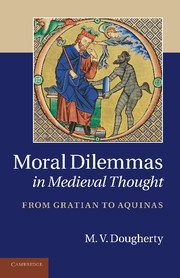Book contents
- Frontmatter
- Contents
- Preface
- Introduction
- 1 Gratian and his glossators on conflicts in the natural law
- 2 Twenty moral dilemmas from two early thirteenth-century summaries of theology: William of Auxerre's Summa aurea and the Franciscan Summa Halesiana
- 3 Raymond Lull and moral ensnarement in the Vita coaetanea
- 4 Thomas Aquinas, moral dilemmas, and a missing article from Quodlibet XII
- 5 Thomas Aquinas on failures of practical reasoning: Why synderesis doesn't inoculate agents against malformed conscience dilemmas
- 6 Moral dilemmas in the early Thomistic tradition: Johannes Capreolus and the Deceiving Demon Dilemma
- Conclusion
- Bibliography
- Index
1 - Gratian and his glossators on conflicts in the natural law
Published online by Cambridge University Press: 03 May 2011
- Frontmatter
- Contents
- Preface
- Introduction
- 1 Gratian and his glossators on conflicts in the natural law
- 2 Twenty moral dilemmas from two early thirteenth-century summaries of theology: William of Auxerre's Summa aurea and the Franciscan Summa Halesiana
- 3 Raymond Lull and moral ensnarement in the Vita coaetanea
- 4 Thomas Aquinas, moral dilemmas, and a missing article from Quodlibet XII
- 5 Thomas Aquinas on failures of practical reasoning: Why synderesis doesn't inoculate agents against malformed conscience dilemmas
- 6 Moral dilemmas in the early Thomistic tradition: Johannes Capreolus and the Deceiving Demon Dilemma
- Conclusion
- Bibliography
- Index
Summary
Gratian is considered the founder of the scientific or systematic study of canon law on the basis of his influential synthetic work, the Decretum. An early section of that book deals with moral dilemmas, and this chapter will examine its argumentation and early reception. While the Decretum is well known, the same cannot be said of the details of its author's life. The amount of legend that surrounds the twelfth-century jurist is inversely proportional to the verified facts about him. If one listens to the former, one will hear that Gratian was a monk, either Benedictine or Camaldolese; that he resided at the monastery of Saints Felix and Nabor in Bologna and taught canon law there; that he was the brother of the Parisian theological master Peter Lombard; that his first name was Franciscus (or perhaps Johannes); and that during his ecclesiastical career he rose to the rank of abbot, bishop, or even cardinal. All of these claims have been found to be largely unconfirmed and traceable to questionable sources at times centuries removed from Gratian's day. What is verified is quite minimal: Gratian finished the Decretum sometime after 1139 and before 1158, he resided for a time in Bologna, and in addition to legal interests he also held theological ones. Whether he was a layman or a cleric, an academic professor of law or a practicing lawyer, or a young author at the completion of the Decretum or a mature one, will remain unknown absent the discovery of some new source material.
- Type
- Chapter
- Information
- Moral Dilemmas in Medieval ThoughtFrom Gratian to Aquinas, pp. 13 - 40Publisher: Cambridge University PressPrint publication year: 2011



